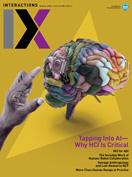Authors: Ashley Karr
Posted: Thu, November 13, 2014 - 10:43:16

- Users want to see a sample of your design. For example, they want to see pictures, a demo, or a video of how your design functions. Telling your users about your design through speech or text is not as effective as showing them, unless, of course, you are working with a visually impaired population. If users aren’t able to see a representative example of your design functioning, they will lose interest very quickly.
- Users want to know what your design will cost in terms of money. Hiding fees or prices associated with your design breaks trust. If users can’t find fees or prices quickly and easily, they become disinterested in your design and either look to competitors or simply move on. When conducting research on pricing and fee structures, 100% of users in my studies have told me that they are willing to pay more money (within reason) for a product or service if that means they are able to find out how much money they will be spending upfront. Another design decision that can break trust is using the term free. 100% of users that I have studied regarding this phenomenon state something like, “Nothing in this world is free. What are they hiding from me?” Interestingly, I have done studies on systems that are purely informational and very distant from the world of commerce. Users were still concerned that they would be charged in some way for their use of the system.
- Users want to know how long it will take to use and/or complete a particular task with your design. Users do not believe you when you say or write that your design saves time, is easy to learn, and quick to use. If you tell your users these things, you waste their time and break their trust. If you show them how quick and easy your design is, and your design actually performs this well, then you’re getting somewhere.
- Users want to know how your design will help or harm them if they decide to start using it. As one of my students said, “Users want to know how your design will make their life more or less awesome before they decide to truly commit and interact or purchase.” This transcends time and money, and moves into deeper realms, such as adding more meaning to peoples’ lives or more positive engagement with their surroundings.
To recap, users want to know what your design is, what it costs, how long it will take to use, and how it will make their life more awesome (or not)—and in that order. These may seem like overly simplistic design elements, but very basic things get overlooked in the design process all the time. If those basic elements do not make it into the design before launch or production, disaster and failure may strike. Also, this list helps me when I get stuck due to over thinking and possibly over complicating a design. It reminds me to keep my design straightforward and highly functional for my users.
Straightforward. Highly functional. These may be the two most important characteristics of any design. Add those to the four things that every user wants to know, and we have six quality ingredients for user-centered design.
Posted in: on Thu, November 13, 2014 - 10:43:16
Ashley Karr
View All Ashley Karr's Posts







Post Comment
@ryansmith53 (2025 06 06)
Perfect for school breaks, short commutes, or late-night gaming sessions, poor bunny fits any schedule. You can play for just a few minutes or get lost in it for hours. It’s accessible, lightweight, and incredibly fun. A real hidden gem among arcade-style games.
@doodle jump (2025 07 31)
Jump to great heights with a peculiar four-legged monster named “The Doodler” in the hit platformer doodle jump. In order to reach the highest possible level, you must continuously leap from one platform to another.
@ahr147 (2025 08 13)
samba
เยว่เค่อ
relex